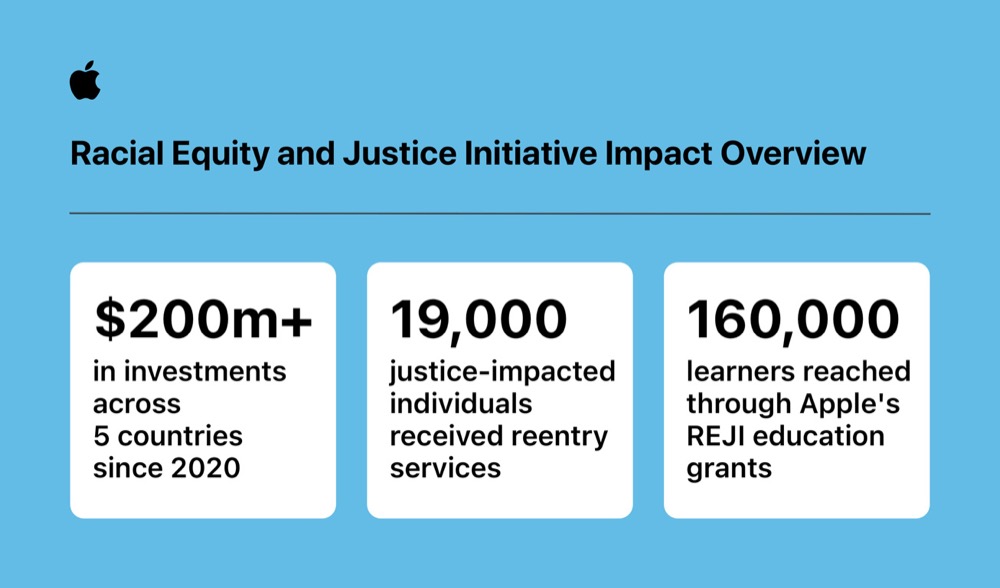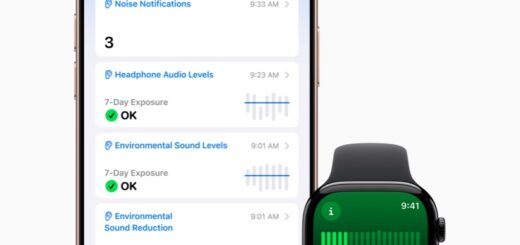Apple publishes Racial Equity and Justice Initiative report

Apple’s global Racial Equity and Justice Initiative (REJI) has invested over $200 million in its attempt to support minority businesses and erode systemic barriers to funding that impacts these groups. The company has now published its first ever Impact Overview of the scheme.
Building a more just world is urgent work
This is a classic case of putting its money where its mouth is and reflects the commitment the company made following the huge protests against racial injustice in response to the disgusting murder of George Floyd in the US.
“Building a more just and equitable world is urgent work that demands collaboration, commitment, and a common sense of purpose,” said Tim Cook, Apple’s CEO.
“We are proud to partner with many extraordinary organizations that are dedicated to addressing injustice and eliminating barriers to opportunity. And we’ll continue to lead with our values as we expand our efforts to create opportunities, lift up communities, and help build a better future for all.”
“We launched REJI at a critical inflection point for our country,” said Lisa Jackson, Apple’s vice president of Environment, Policy, and Social Initiatives. “We are resolved to keep building on the progress we’ve made to ensure equitable opportunity for Black and Brown communities across America and around the world.”

REJI at a glance
Since launching REJI in June 2020, Apple has supported education, economic empowerment, and criminal justice reform work across the U.S., with recent expansion to Australia, the U.K., and Mexico.
The initiative aims to address systemic barriers to access, create opportunity, and supply funding to support underrepresented and under resourced communities and businesses of color.
The company has shared some highlights of its work so far:
- REJI’s education grants have helped 160,000 learners through in-person courses and out-of-school offerings.
- Apple has put $50 million to Historically Black Colleges and Universities (HBCUs) and Hispanic-Serving Institutions (HSIs) to support science, technology, engineering, arts, and math opportunities.
- REJI funds financial institutions — including venture capital firms, Community Development Financial Institutions, and Minority Depository Institutions — that support Black, Hispanic/Latinx, and Indigenous entrepreneurs and businesses
- The initiative’s criminal justice reform grants have supported legal services, safe housing, identification services, healthcare access, and other vital reentry services for more than 19,000 justice-impacted individuals.
- Apple today committed an additional $25 million to Collab Capital, Harlem Capital, and VamosVentures — three venture capital funds working with minority-owned businesses.
- Apple has entered a new partnership with the My Brother’s Keeper Alliance (MBKA), a program of the Obama Foundation. The program plans to train more than 500 leaders and engage over 50,000 youth across the U.S.
- “Apple’s continued support of the My Brother’s Keeper Alliance empowers the foundation to develop and implement new initiatives that create opportunities for our young people,” said Valerie Jarrett, the Obama Foundation’s CEO.
- Apple is a founding partner of Propel, a global HBCU technology and innovation hub. This summer, Propel will introduce Propel Learn.
- Apple has partnered with several community colleges — including the Los Angeles Community College District, Delgado Community College in New Orleans, and Houston Community College — to implement programs to help incarcerated and paroled individuals learn new skills, prevent recidivism, and create economic opportunity for parolees and probationers.
- Apple has also made meaningful contributions to various nonprofit organizations that advance equity and justice, including the Anti-Recidivism Coalition, Defy Ventures, Vera Institute of Justice, and The Last Mile.

Apple continues to invest in educational empowerment
Racial justice is a global task
REJI is a global attempt. Already active in the US, Australia, Mexico, and UK, Apple is now extending the scheme into New Zealand and Australia.
In New Zealand it is working with Te Pūkenga — New Zealand Institute of Skills & Technology, the country’s largest vocational educator. This work will support efforts to give educators the skills they need to prepare underrepresented Māori and Pasifika students to enter the country’s growing technology sector.
In Australia, Apple announced REJI’s expansion in August 2022 with initial grant funding to support initiatives and nonprofits serving Indigenous communities, including Deadly Connections, ID. Know Yourself, First Australians Capital, Art Gallery of NSW’s Djamu Youth Justice program, and Original Power.
Now it is also funding Karrkad Kanjdji Trust, a charitable trust established by the Traditional Owners of Warddeken and Djelk Indigenous Protected Areas (IPAs) to achieve their vision for a healthy country. Apple also supports the Women Rangers program.
In the U.K., Apple partnered with the Southbank Centre to launch Reframe: The Residency, a program designed to reduce the barriers that exist for aspiring Black creatives. In May, the program’s first cohort was selected from London, Birmingham, and Manchester. Artists will present their work at a free exhibition, which opens on Tuesday, July 18, at the Southbank Centre.
In Mexico, REJI has partnered with Enactus to support the expansion of iOS Development Labs that teach coding with Swift and prepare learners for careers in Mexico’s thriving iOS app economy.
Apple’s New Silicon Initiative at HBCUs across the US helps prepare students for careers in the growing fields of hardware technology, computer architecture, and silicon chip design. Grants awarded to Alabama A&M University, Howard University, Morgan State University, and Prairie View A&M University support engineering programs as they develop their curricula in partnership with Apple experts.
Launched with an investment from Apple, the Global HSI Equity Innovation Hub at California State University, Northridge (CSUN) aims to equip Hispanic/Latinx and other historically underserved students with high-demand skills in science, technology, engineering, and math. In collaboration with other California State University campuses and HSIs across the country, the hub accelerates educational equity while equipping students to succeed.

Apple also changes itself
Apple has also made changes in its own operations to try to address these lacks. For example, it now represents displays tribal, First Nations, Inuit, and Métis territories in the U.S. and Canada in Maps.
Apple recently worked in collaboration with representatives from the Chickasaw Nation and the Choctaw Nation to add Chickasaw (Chikashshanompaʼ) and Choctaw (Chahta) language support in the keyboard on iPhone, iPad, and Mac
Maps also implemented support for dual-language labels — including in Indigenous-language syllabaries — and redesigned the Maps place card used for Indigenous lands to show more detail, working directly with communities to curate their place card content.
- Strengthen Local Communities (SLC) is an Apple grant program that provides funding to local organizations where Apple team members live and work, including grants to minority-led organizations focused on environmental equity and justice. The program is helping to train future environmental leaders, provide low-cost tools for educators, and ensure that First Nation communities benefit from the transition to clean energy.
- To support communities disproportionately impacted by climate change, Apple works directly with organizations, including Environmental Health Coalition, Little Village Environmental Justice Organization, Native Conservancy, Original Power, and UPROSE. These advocate for frontline communities, advance climate justice, and cultivate solutions that prioritize equity and community building within the environmental movement.
- Apple’s Challenge for Change Learning Series is designed to help learners of all ages explore important issues in their communities and create innovative solutions to make lasting impact. To learn more, visit education.apple.com/#/home/rp/R005920.
Please follow me on Mastodon, or join me in the AppleHolic’s bar & grill and Apple Discussions groups on MeWe.




